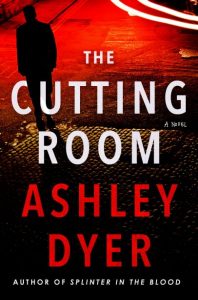What Success Means to a Writer
 What success means to a writer
What success means to a writer
by Ashley Dyer
Success is easily quantifiable if it’s equated with sales and earnings. But is it right to measure writing success in those terms? Is writing success quantifiable at all?
In a writing career of twenty-three years, my novels have been published in the UK, the USA and translated into eleven languages across Europe.
Is that success? It certainly looks like it. But it took five years and two unpublished works to even find a publisher.
Is that failure? C.S. Lewis wrote that, “Failures . . . are fingerposts on the road to achievement.” I wish I’d had that little nugget of authorial wisdom to comfort me back then.
On the plus side, I wrote my first novel despite experiencing word-finding difficulties after suffering several TIAs (mini-strokes). Plus, I had an agent—and when a senior editor at a leading publishing house responded to my second submission with: “Murphy can write; that is not in question”, I chalked that up as my first success (or at least a fingerpost on the way to it).
That work wasn’t commissioned, but the next novel did find a publisher, and was shortlisted for The First Blood award. A tick for the “success” box, surely? Well, kind of . . . You see, the First Blood award was a protest by book critics after the Crime Writers’ Association committee vetoed the Creasey Dagger shortlist, refusing to announce a winner, or even to publish the shortlist. Apparently, certain members of the committee disapproved of low morals and profane language in crime fiction(!).
Of the five novels I’ve had published in the United States, four have received coveted Publishers Weekly starred reviews. I was delighted with each and every one, but I didn’t fully comprehend just how significant they were because those reviews didn’t result in sales hikes. —Critical acclaim, as a past editor once told me, is no guarantee of commercial success.
So, should success be measured in stars, or filthy lucre?
Let’s take a closer look at the context: a recent report in the UK found that the highest-earning 10 percent took home about 70 percent of total author earnings.
Does that mean the 90 percent who share the rest are failures by default? Surely not. Sales figures are gathered by Nielsen BookScan, a database which works using simple algorithms; the data is neither nuanced nor contextualized in terms of the marketing, publicity, deals, or promotions applied to the top ten-percenters’ books. On that basis, it’s impossible to make a meaningful comparison between the ten percenters’ BookScan sales and the other ninety percent.
For much of my career—excluding a couple of best-sellers in the UK and Germany—I’ve been one of the ninety-percenters. Consequently, I’ve had limited opportunities to use sales as an indicator of success. So, I have an “Alt-Success Measures” list which includes: critics’ and peer-approval; shortlistings for awards; the Dagger win; the excitement of discussing an adaptation of Splinter in the Blood with the makers of True Detective and The Revenant (oh boy, that was thrilling!). On a more poignant note, hearing from a reader that a scene in one of my books helped her to understand her son, a recovering addict, was success on a very different plane. And if listening to my audiobooks lifted a woman out of deep depression after she’d lost her sight, I’d call that Success with a capital S.
A sceptic might say it’s all very well for a ninety-percenter at the outer limits of bestsellerdom to look for the positives and label uplifting moments as successes. But are they—or are these really over-optimistic attempts to bolster my self-worth? Publishing is a business based on hope, after all, and author and literary critic Joan Smith says authors are particularly prone to “insane optimism”. To get a view from the heights, I asked a few bestselling authors what success means to them.
Sharon Bolton, author of thirteen internationally acclaimed bestsellers, said, “It’s nice to be financially comfortable, but I think the best part is that, from time to time, I hear from readers who have been deeply touched by my books. These personal testaments always make me feel deeply privileged.”
Ann Cleeves is the multi award-winning author of the Vera and Shetland series which have also been adapted for two hugely successful long-running TV series. She said with characteristic modesty, “I was fortunate that success came very late in my writing career.” (Her breakout novel was her 20th after 20 years of writing.) Commercial success, she added, is “as much about luck and persistence as talent. So [it] hasn’t brought pressure or expectation.”
In contrast, Harriet Tyce is one of the fortunate (or perhaps unfortunate?) few whose debut novels are runaway successes. Blood Orange hit bestseller lists around the world, but she has experienced exactly the kind of pressure Cleeves had avoided by virtue of being made to wait 20 years for recognition. Despite this, Tyce feels “incredibly lucky”. Success has allowed her to take her work more seriously and has given her greater confidence. “However, it brought a level of pressure in the writing of the second book which was hard to negotiate.” —Tyce scrapped 80,000 words of book #2, but happily, she got over that hurdle, and has now completed the novel.
Practising lawyer and multi award-winning thriller writer, Shannon Kirk, says that success is “highly subjective and personal and evolving”. She subdivides successes into “high goals” (mostly professional), which include being published, and “every day living success”, encapsulated in the enjoyment of family and appreciation of the arts, both of which are reliant on her ability to “own my own time”. But as Bette Davis said, “Success only breeds a new goal.”, and Kirk admits she doesn’t always allow herself time to enjoy her successes, adding, “I always do reset the goal.’
So, it seems that success is not absolute, or fixed; nor is it entirely dependent on sales. For many authors, success is allied to self-fulfilment and self-determination—as well as moments of human contact which establish a profound and personal connection with complete strangers.
The Cutting Room by Ashley Dyer, is now available in hardcover and ebook from William Morrow.
________________________________________________
The Cutting Room, by Ashley Dyer
 Detectives Ruth Lake and Greg Carver, introduced in the electrifying Splinter in the Blood, must stop a serial killer whose victims are the centerpiece of his macabre works of art.
Detectives Ruth Lake and Greg Carver, introduced in the electrifying Splinter in the Blood, must stop a serial killer whose victims are the centerpiece of his macabre works of art.
While Britain is obsessed with the newest hit true-crime television show, Fact, or Fable? detectives Ruth Lake and Greg Carver are tormented by a fiendish flesh-and-blood killer.
Lured to a “crime scene” by a mysterious digital invitation, Ruth Lake is horrified to find a bizarre and gruesome tableau surrounded by a crowd of gawkers. The deadly work is the latest “art installation” designed by a diabolical criminal dubbed the Ferryman. Not only is this criminal cold-blooded; he’s a narcissistic exhibitionist desperate for an audience. He’s also clever at promoting his deadly handiwork. Exploiting England’s current true-crime craze, he uses social media to titillate and terrorize the public.
Ruth is joined in the investigation by her partner Greg Carver, who is slowly regaining his strength after a run-in with another sadistic criminal. Greg can’t seem to shake the bewildering effects of the head wound that nearly ended him. Are the strange auras blurring his vision an annoying side effect of his injury, or could they be something more . . . a tool to help him see a person’s true nature? In this utterly engrossing and thrilling tale of suspense, a pair of seasoned detectives face off against a wickedly smart and inventive psychopath in a tense, bloody game that leads to a shocking end.
“Disturbing and wickedly entertaining.” —People Magazine
Full list of buying links USA
Also available at AmazonUK
Bio, Ashley Dyer
Ashley Dyer is the penname of Margaret Murphy, consulting with forensics expert and Vera and Shetland adviser, Helen Pepper. Margaret Murphy wrote nine psychological novels under her own name and a trilogy of forensic thrillers as A.D. Garrett, before morphing into Ashley Dyer to begin a new series of thrillers featuring Detectives Greg Carver and Ruth Lake. The founder of Murder Squad, she is a former Royal Literary Fund Writing Fellow, a past Chair of the Crime Writers Association, has been shortlisted for the “First Blood” critics award and the CWA Dagger in the Library, and is a Short Story Dagger winner.
Visit www.ashley-dyer.com for news, events, “Shelf Indulgence” book reviews, and occasional vlogs on writing and forensics.
Twitter: @ashleydyer2017 Facebook: @ashleydyernovels Instagram: @ashleydyerauthor
Category: Contemporary Women Writers, How To and Tips























